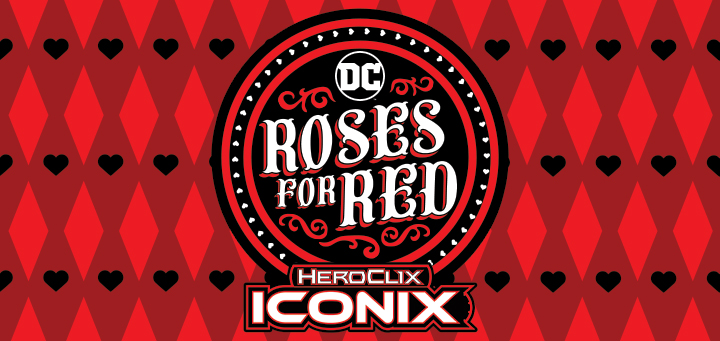Dear WizKids fans,
First off, thanks for such a great Origins show — it was amazing! It was great talking with all of you, and seeing the enthusiasm for everything we have in store and seeing the fun everyone was having!
As we do at every show, we ask people what they are enjoying and what areas are frustrating for them. One subject that has come up over the years is that “turtling” is still a major frustration in competitive play. This is not a new problem and we know that strategies like turtling are somewhat inherent in having a game that allows free movement. Even games like Chess with much more limited movement can suffer from similar issues. It’s a problem we’ve been thinking a lot about and here are some brief highlights of our thoughts:
- Being able to KO a low point character and then turtling takes away from the spirit of HeroClix as an action packed miniatures combat game — would a hero or villain group be happy knocking out a single henchman or sidekick and then letting the big names get away? We don’t think so.
- In terms of tournament record, why does a KO of a low point character count the same as a game where both players are locked in epic combat losing most of their pieces as they try to wipe out the entire opposing team?
- How can we incentivize strategies and team builds that encourage playstyles most players have said they prefer?
- How can we test ideas that may help alleviate some of the issues with turtling, specifically with a large group of players?
We’re announcing a single bracket at GenCon that will trial a new method of scoring. The HeroClix Constructed Regional Championship scheduled be held on 8/17/17 will be changed from single elimination to 6 rounds of swiss and use the following method for determine rankings.
Each player in a round will score a number of match points (MP) equal to the number of KO points they scored against their opponent (max 300) plus their surviving points/2 (rounding up the nearest point).
Basically: MP = KO points + Surviving points/2
Each player’s MP will be compared against the field’s MP for that round. Players will be awarded tournament points (TP) based on how their MP compares to the rest of the players in that round.
3 TP if in top 33% of MP for the round
2 TP if in middle 33% of MP for the round
1 TP if in bottom 33% of MP for the round
+1 TP if you won your individual match (regardless of MPs)
Players will then be bucketed based on their tournament points (4 vs. 4, 3 vs. 3 etc.) and paired within their TP bucket via MP; highest against highest from the last round. If players are needed from a lower TP bucket, the highest match points from the last round will be used. Match points will not be used in subsequent rounds (Round 1 MPs are only used for seeding round 2, they are subsequently ignored). Ignoring MP from previous rounds helps BYE players and prevents early matches where good players are seated against worse players from racking up easier points.
Top 8 prizing will be determined by rank of total TPs and ties determined by MPs from the final round.
BYE players will be given 3 TPs with zero match points. Since match points are not carried over, this ensures the expert first round BYE player enters the next round well positioned to still win the tournament.
There are many other scoring formulas we investigated, but we think starting here will teach us a lot and lands in the middle of what we’re hoping to accomplish.
Interesting side note: As many of you know, for the first ~5 years of HeroClix, the scoring system included counting your “survival” points and your “KO” points together for tie breakers. While this is not that system, it does bring back survival points as part of the weighting of how one has performed.
What do we mean by a trial?
We hope that the players in the match will plan some extra time to give us their feedback. There will be a WizKids employee identified to run a quick feedback session afterwards. At a minimum, we’ll ask if players preferred the new format vs. the old. Did the formula feel right, or are there some tweaking and various tweaks we could pursue?
We’ll review that feedback and our own observations. After GenCon we may run additional experiments to tune the formula or drop the initiative all together, but what we hope eventually emerges is something akin to this idea of match points determining how players are paired in their matches. Any final implementation would have goals that include:
- Both players are incentivized to battle continuously through a match with their opponent. By using match points to award TPs we believe this can be incentivized.
- A good player that is behind in a match has more opportunity to advance in the tournament. MPs awarding TPs will help, but also having a variable mark to hit each round will incentivize a player in the lead to stay in the battle, giving the trailing player more opportunities to score MPs.
- Both players are incentivized to play their turns quicker. We believe weighing the KO points more than survival points incentivizes this; players should be looking to move combat along to increase their total MPs.
- A great player that loses to another great player still has the chance to advance in all except the last round. Having a spread of tournament points, we believe, should help get players paired to their ability level faster. The best players should be playing the best players earlier, and have more opportunities to claw back from an early small setback against other great players.
- Defense still matters (it does anyway because you need your characters to score points) and while the formula should tilt the players toward engaging in combat, being aware of your own team’s health should be a key consideration.
- Winning the match still matters, not just landing KO’s with no care for how you’re doing in the match.
- BYE players are neither advantaged nor disadvantaged when looking at their chances to win/advance.
- Meta diversity does not decrease.
We do recognize there are lots of potential hurdles with this idea as well. Even if this trial shows promise, we expect tweaks and future confirmations. We are not going to broadly roll out a new scoring method unless it’s clear the benefits outweigh the downsides, but we are hopeful there is something here that can be built on and perhaps lead to a better experience down the road. We thank you for your feedback, attention and patience as we work through these ideas. Your feedback is very important to us.




